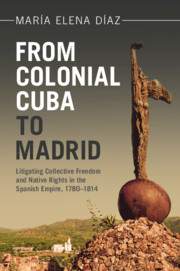 From Colonial Cuba to Madrid
From Colonial Cuba to Madrid Book contents
- From Colonial Cuba to Madrid
- Afro-Latin America
- From Colonial Cuba to Madrid
- Copyright page
- Contents
- Figures and Tables
- Acknowledgments
- Introduction
- 1 Imperial Reform, Privatization, and Enslavement
- 2 An Unorthodox Pueblo and Its Apoderados
- 3 Making the Case for Collective Freedom
- 4 Native Bonds, Native Rights
- 5 The Council’s Ruling and the Politics of Litigation
- 6 A “Pernicious” Communication
- 7 Violence, Marronage, and Litigation
- 8 The Final Outcome of the Case
- 9 The Nineteenth-Century Afterlife of the Freedom Edict of 1800
- Conclusion
- References
- Index
7 - Violence, Marronage, and Litigation
Published online by Cambridge University Press: 14 November 2024
- From Colonial Cuba to Madrid
- Afro-Latin America
- From Colonial Cuba to Madrid
- Copyright page
- Contents
- Figures and Tables
- Acknowledgments
- Introduction
- 1 Imperial Reform, Privatization, and Enslavement
- 2 An Unorthodox Pueblo and Its Apoderados
- 3 Making the Case for Collective Freedom
- 4 Native Bonds, Native Rights
- 5 The Council’s Ruling and the Politics of Litigation
- 6 A “Pernicious” Communication
- 7 Violence, Marronage, and Litigation
- 8 The Final Outcome of the Case
- 9 The Nineteenth-Century Afterlife of the Freedom Edict of 1800
- Conclusion
- References
- Index
Summary
Chapter 7 deals with the violence unfolding at the local level and with the cobreros’ extrajudicial forms of mobilization in tandem with legal actions. Here the story of legal action merges with one of extrajudicial actions such as fugitivity and more violent action and shows how judicial and extrajudicial actions were entangled with each other. Cosme’s letters from Madrid also provided legitimacy to the cobreros’ extrajudicial actions by directly informing the community that the king’s edicts favored their freedom. Factoring into the escalating threat of violence and political conflict on the ground was the broader Atlantic context of revolution in Saint Domingue and war with the British during the 1790s. Imperial designs in this period seem to conflict with colonial ones in a triangulation of conflict that included the cobreros’ actions.
Keywords
- Type
- Chapter
- Information
- From Colonial Cuba to MadridLitigating Collective Freedom and Native Rights in the Spanish Empire, 1780–1814, pp. 230 - 256Publisher: Cambridge University PressPrint publication year: 2024
